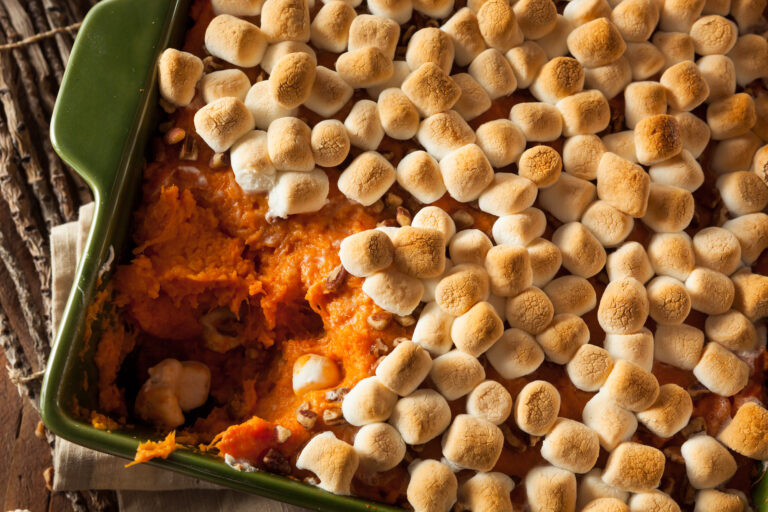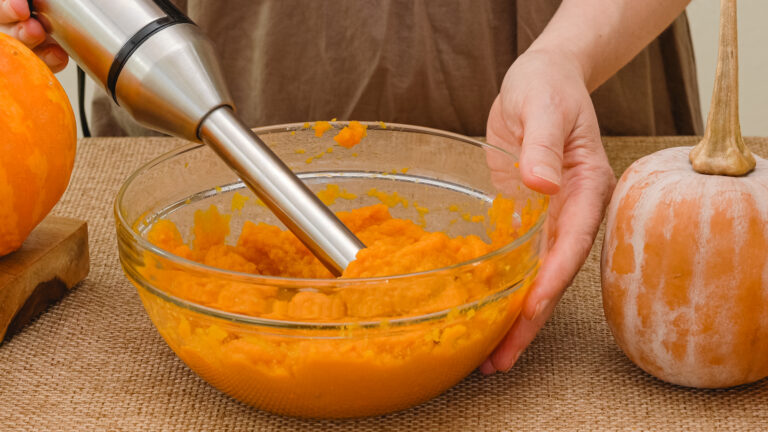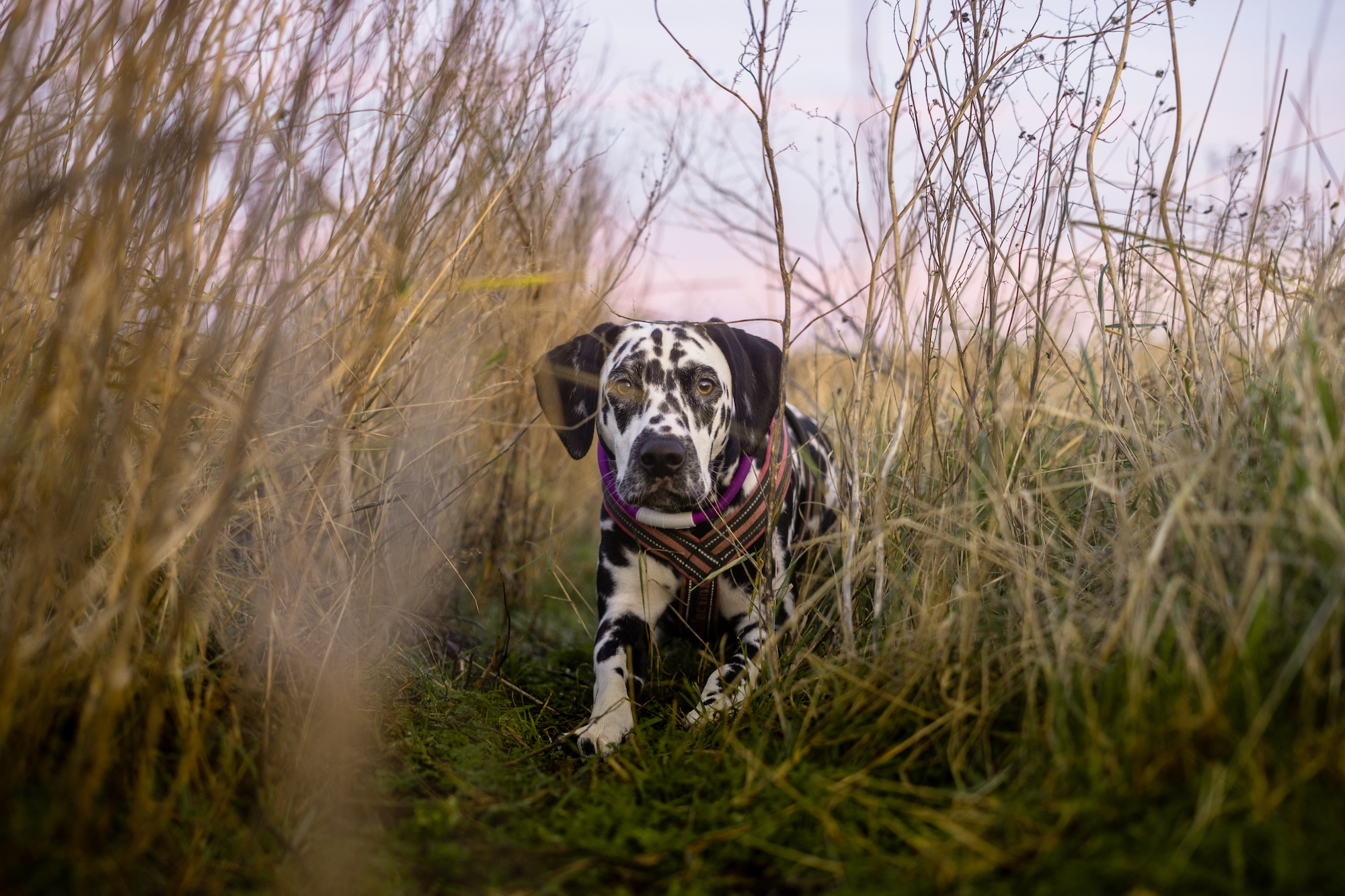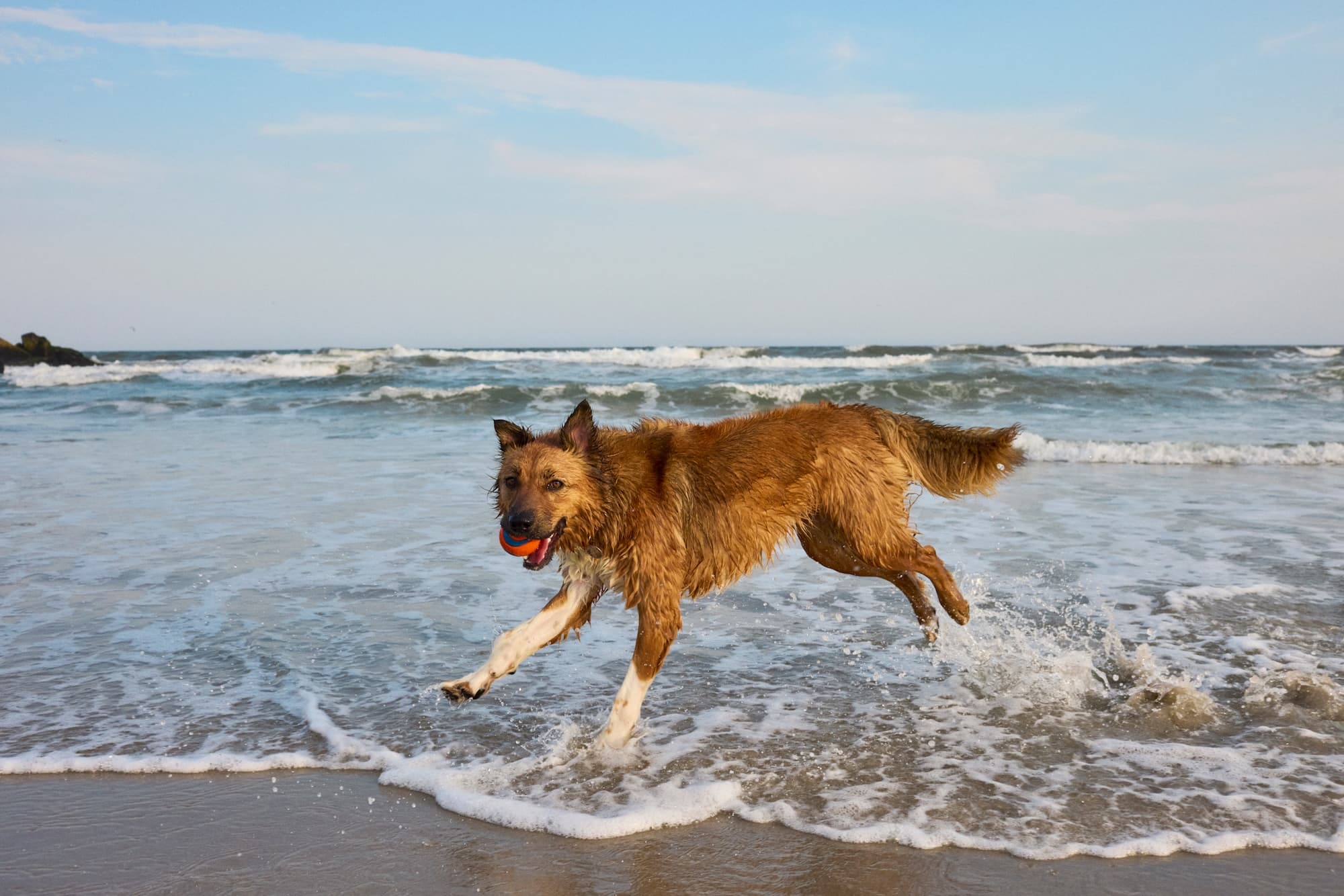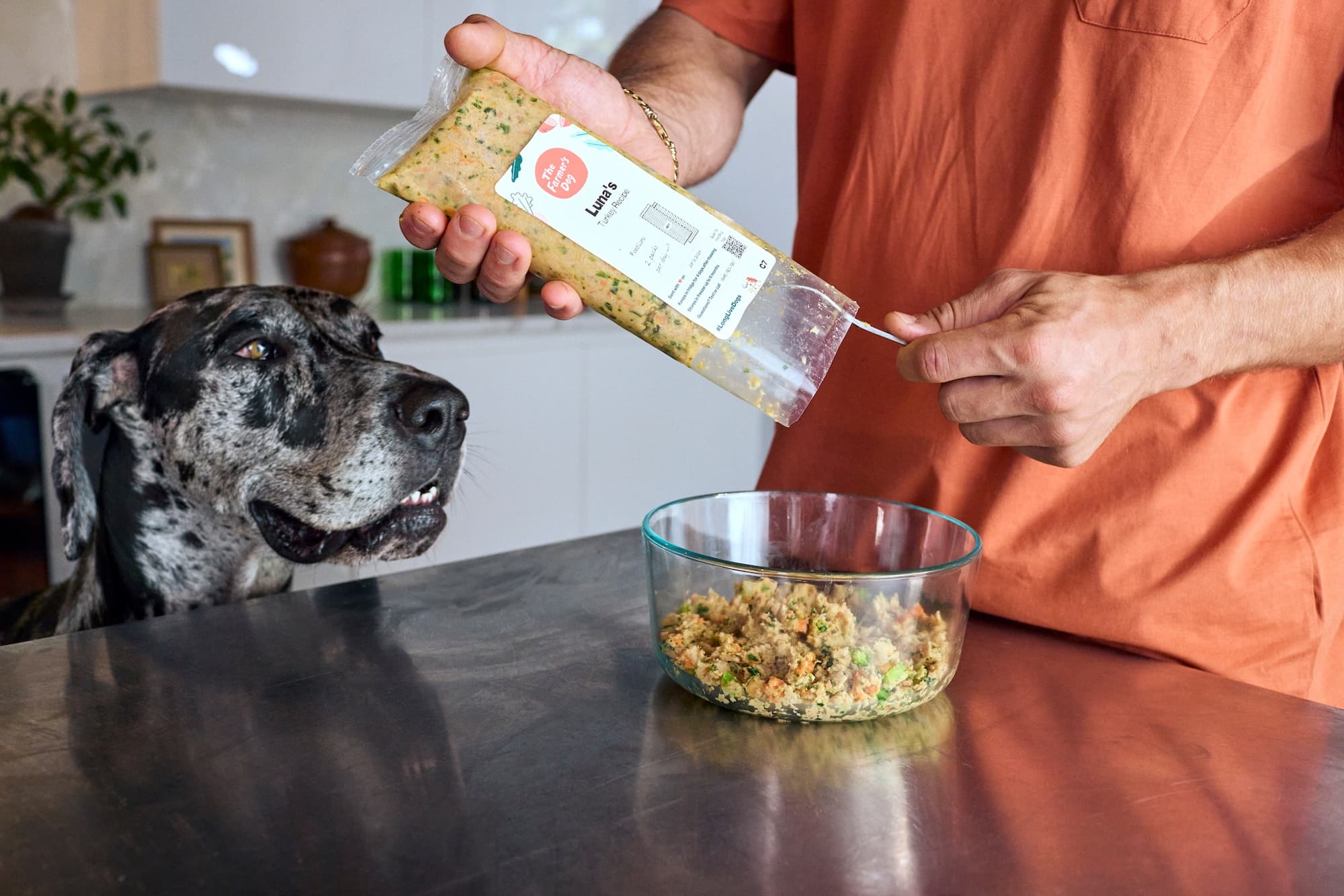When the holidays roll around, it’s hard not to get excited for everything that involves turkey, stuffing, cranberry sauce, sharing a meal with family and friends, and sitting in the corner with the dog to avoid tense arguments. And for all their emotional labor, don’t dogs deserve a seat at the table or, at the very least, a plate of their own?
Because Thanksgiving, Christmas, and Hanukkah dishes tend to be rich, full of fats, spices, sugar, and other ingredients that range from slightly unhealthy to downright dangerous, sharing a seasonal plate with your four-legged housemate isn’t quite as easy as loading up a little of each dish and letting them have at it. Feeding fatty table scraps and other dog-inappropriate foods can cause or exacerbate inflammation, weight gain, and pancreatitis.
That doesn’t mean, however, that your dog can’t also enjoy your family celebration.
First, keep in mind that extra play-time, and a fun toy can be a great way to reward your dog and keep them busy on special days like this. But if you want to mark the occasion with some food-based excitement, we broke down what holiday foods your dog can and can’t eat, and how to give them their own special holiday meal (or at least a special treat).
And here’s our usual disclaimer: Too many extras can throw off the nutritional balance of your dog’s diet, so feed even the healthiest treat in moderation!
Can my dog eat Thanksgiving/Christmas turkey?
No, not straight from your bird.
Turkey is good for dogs: it’s rich in protein and other essential nutrients such as iron, phosphorus, and zinc, and it’s low in fat.It’s a key ingredient in one of our very own fresh recipes!
But Thanksgiving and Christmas turkey is often prepared using mega-amounts of salt and butter, as well as onion and garlic (the latter two of which shouldn’t be fed to dogs), which means carving off a hunk of meat straight from the bird is a no-no. If you’ve brined your turkey, or prepared it with lots of butter, salt, and seasonings, and with onions and other things stuffed in the cavity, don’t feed it to your dog.
Feed this instead: Plain turkey.
If you do want to give your dog turkey, make sure it’s plain meat with skin removed. So, if you’ve taken one for the team and made your family bird without a lot of added salt or fat, or anything else, feel free to feed a small amount to your dog. But if you’ve made the usual Thanksgiving turkey, skip serving it to your dog. And be sure to steer clear of cooked turkey bones!
What about gravy?
No.
There are as many different recipes for gravy as there are families celebrating the holidays, but there are a few things that are reliably present in most traditional gravy: fat-laden pan drippings, and salt. It’s a decadent extra whether jarred, from the packet, or made from scratch. And, in addition to fat and seasonings, gravy can contain garlic and/or onion, which should be kept away from dogs. While it’s safest to skip, if you do give your dog any gravy, make sure it’s free of garlic and onion, and that you feed a very small amount.
Feed this instead: Bone broth.
Your dog will be happier, and healthier if their meal is topped with a bit of canine-appropriate bone broth. Bone broth, made by simmering bones and connective tissue for a long, long time, is a nutrient-dense elixir that’s said to have many health benefits for people, and dogs. Prepared without added seasoning or garlic, it’s a safe and healthy addition to your dog’s diet. Read more about making bone broth here.
Mashed potatoes?
Only in the smallest amounts, and with caveats.
Most mashed potatoes served at Thanksgiving and Christmas are loaded with butter and salt, perhaps garlic, and other seasonings that make this dish too decadent, and possibly dangerous, for dogs.
And while potatoes contain plenty of nutrients, like vitamins C and B6, folate, and potassium, they are high in starch (for a vegetable), which can negatively impact blood sugar long term (and always avoid raw potatoes, as well as the green parts of the potato’s skin as they contain a toxic component called solanine).
Feed this instead: Plain, cooked potato (or, better, sweet potato).
If you want to share a bit of potato in honor of this festive occasion, be sure they’re boiled, mashed, and served plain—so separate some mash for your pup before you load in the butter, salt, or other flavorings. And make the portion extra small. Or, a better idea: serve pureed sweet potato (see below) or pumpkin (see also below).
Your super-sweet sweet potato casserole…
No.
Many of us confront sweet potatoes on the Thanksgiving table in the form of sweet potato casserole mixed with brown sugar and nutmeg, topped with marshmallows. Only one of these things is good for dogs, and it’s the sweet potato. Sugar isn’t toxic to dogs per se, but it can contribute to dental disease, acute pancreatitis, diabetes, obesity, and inflammation in dogs, and can also cause stomach upset. And nutmeg should be avoided entirely; it contains a toxin called myristicin which is dangerous for dogs. While it typically takes fairly large amounts to cause serious ill effects (signs of toxicity include hallucinations, dry mouth, increased heart rate, seizures, and worse) you should steer clear of nutmeg to be safe.
Feed this instead: Plain sweet potato.
Sweet potatoes are great for dogs and a popular mixer to make dog food more palatable. They’re great for digestive health, high in potassium, and a low-fat, high-reward treat.
If you’re fixing a plate for pup, set aside some plain sweet potato, either canned or boiled. Mash up a small amount and serve solo or as a food topper.
Green bean casserole?
No.
A timeless classic, green bean casserole is a family favorite because it takes a delicious, healthy vegetable and applies all manner of flavorful enhancements, including butter and salt, not to mention cream of mushroom soup, which is high in salt, sugar, and fat, and fried onions, similarly full of fat, and also toxic to dogs. So save that unctuous treat for your human family.
Feed this instead: Plain green beans.
Green beans themselves are low-calorie, high-nutrient vegetable that is great for dogs. You can feed them raw, steamed, or boiled—just be sure to avoid canned beans that have added salt. Trim the ends and cut into small pieces to reduce the chance of choking.
Brussels sprouts?
Yes. But.
Brussels sprouts have experienced something of a renaissance. Once the over-cooked and unloved bane of every kid’s existence, they’re now a more sought-after side. BUT, the very things that have made them more popular—the addition of tons of bacon and fat and seasonings—also make them a bad idea as a treat for your pup. Sprouts themselves are a healthy (if gas-producing) snack, full of beneficial vitamins as well as antioxidants that can reduce inflammation. But if your recipe contains lots of bacon, butter, garlic, or other extras, keep them for yourself.
Feed this instead: Set aside a sprout or two for your dog. Boil or steam them and cut into pieces and add them to their Thanksgiving dinner.
Glazed carrots?
Nope.
Carrots make a nice treat for dogs in moderation. But Thanksgiving carrots, coated in sugar or maple syrup and other seasonings can cause upset stomach and diarrhea, and if your dog is diabetic, more serious side effects.
Feed this instead: Set aside some plain carrots. To feed them to your dog, steam them, cut them into small pieces or mash, and add them to your dog’s food. Lightly cooking carrots actually makes their healthy beta-carotene more readily available to your dog. Make sure to always wash and peel carrots to help remove dirt and pesticides.
Is stuffing ok?
No.
Whether boxed or homemade, stuffing is full of salt and fat, two things which can upset your dog’s stomach and cause diarrhea or vomiting. Many stuffing recipes also include onions, garlic, and other seasonings that are toxic to dogs.
Feed this instead: Actually, just skip the bread-based sides, and stick to some healthy meat and veg treats.
Cranberry sauce?
No.
While plain cranberries are fine to give dogs sparingly, cranberry sauce is basically cranberry-flavored sugar, and too much can cause gastrointestinal upset in the form of vomiting and diarrhea. Further, some recipes, especially for homemade cranberry sauce, include nutmeg, mace, and other spices that are dangerous for dogs.
Feed this instead: If your dog likes the tart taste, feed a few fresh or dried cranberries. You can crush them to make them easier to eat and reduce choking hazard. Be sure to stay away from cranberry sauce and cranberry juices which can contain added sugars and other ingredients, and avoid Craisins!
Or, feed a few blueberries! They’re loaded with vitamins and minerals and known for their high levels of health-boosting antioxidants and phytochemicals.
Mac and cheese?
No.
This should be easy, since you’ll want it all to yourself! Keep the mac and cheese away from your pup. Like so many other Thanksgiving sides, it’s likely full of butter, spices, salt, and other additives.
Feed this instead: If you’re tempted to honor the special occasion by giving your pup an extra-special snack, give them a small bit of cheese. Low-lactose hard cheeses like parmesan and cheddar may be a little easier on their stomach. You can also pick lower-fat types like mozzarella or goat cheese.
Pumpkin pie?
No.
Pumpkin pie has far too much sugar and fat, and many pumpkin pie recipes have nutmeg, which can be toxic to dogs in large quantities.
Feed this instead: Just pumpkin.
You can definitely give your dog pumpkin, which is a healthy, popular treat. Just make sure you give them either canned or plain boiled and mashed pumpkin. They’ll be sure to love it. For an extra special dessert treat, you can also opt to give them a sparing amount of whipped cream (call it a puppaccino). It is a holiday, after all.
Brisket?
No.
While dogs can eat beef—one of our own recipes revolves around it—brisket is too fatty to be healthy for dogs, and the way it’s seasoned is no good for them. Not only is brisket too salty for a pup, but some of the spices could even be toxic to them. Your dog may seem to be drooling over the brisket their human family is eating, but you shouldn’t give them a taste.
Feed this instead: Plain beef. If you don’t season beef, your dog can eat a cooked piece of it. They’ll probably enjoy it. And, of course, you can also choose to feed them beef that comes in a complete and balanced fresh-food recipe for dogs.
Fruitcake?
No.
We’ve all heard the fruitcake jokes, so we’ll skip the general denunciation of this seasonal treat. But regardless of your feelings about the much-maligned dessert, you shouldn’t let your dog have even one bite of it. In addition to its added sugars being bad for your pup, fruitcake can also include ingredients like raisins that can be deadly to dogs in even tiny quantities. Make sure they don’t have any.
Feed this instead: Fruit (one of the types that are good for dogs).
